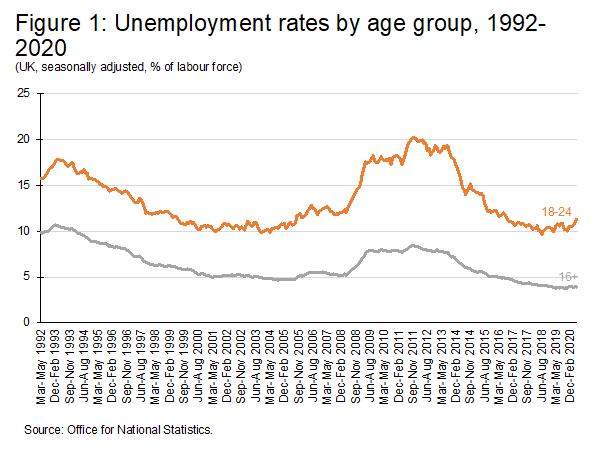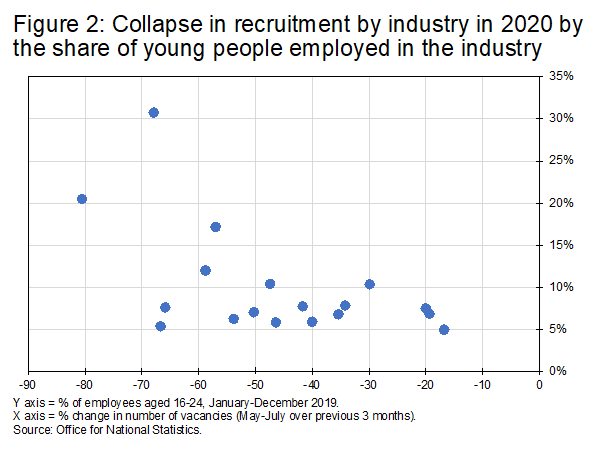
Recruitment and redundancy outlook
Stay up to date with the latest recruitment and redundancy trends in the UK.
Mark Beatson’s article focuses on how the COVID-19 inspired recession has affected employment, especially for young people
Recessions are typically bad news for young people, especially school and college leavers. After the financial crisis, the unemployment rate of those aged 18–24 increased faster than that of all adults (Figure 1).

In addition, subsequent low growth in productivity and wages meant that progression for people entering the labour market then was less than for previous generations of young people.
The COVID-19-inspired recession has been no exception. The industries hardest hit by this recession were those which, pre-pandemic, were most likely to employ young people (Figure 2).

The two industries with the highest proportions of employees aged under 25 – Accommodation & Food and Arts, Entertainment & Recreation – were the industries most affected by the pandemic, with vacancies down two-thirds or more. According to the Resolution Foundation, young people were also more likely to be furloughed than older age groups. And, although there could be issues concerning the reporting of data under lockdown, apprenticeship starts appear to be well down on last year.
Some of the measures taken to protect employment during lockdown could make the situation worse for young people out of work. In particular, the Job Retention Scheme could have discouraged both redundancies and fresh recruitment in those industries affected most by the pandemic.
Hence it is no surprise that the Chancellor’s Plan for Jobs included specific proposals for hiring young people, in addition to measures – such as Eat Out to Help Out – designed to stimulate activity in industries that employ lots of young people.
Two of these proposals – increasing the financial incentives for employers to take young people on apprenticeships and traineeships – essentially turn up the volume on existing mechanisms, though whether these go to eleven is a matter of opinion. Not all the barriers to taking more young people on through these routes will, however, be financial. For example, the workplace-based components of apprenticeships may be challenging to deliver in organisations with much more remote working. Simply paying employers more doesn’t guarantee a solution to all problems.
For these reasons, the Plan proposed a new initiative, the Kickstart scheme, targeted at unemployed 18-24 year olds claiming Universal Credit. Details are still emerging, but the scheme publicity says it will offer work placements of up to six months, with the cost of wages (up to the relevant minimum wage) paid by the Government.
Take-up will be an issue. Will employers want to offer placements? An online poll of CIPD members found that only a fifth thought it likely or very likely that their organisation could accommodate Kickstart placements, whereas three-fifths thought it unlikely or very unlikely. It’s difficult to know what to make of these numbers. They don’t sound great but employer participation in schemes of this kind has always been a problem, with most placements tending to be in the public and voluntary sectors.
Nor should participation by young people be taken for granted. Previous recessions have seen young people try to “hide” in full-time education until economic conditions improve. If this year’s A Level results furor encourages more young people to stay for a while in education, it may prove to be a blessing in disguise.

Mark's respected labour market analysis and commentary strengthens the CIPD’s ability to lead thinking and influence policy making across the whole spectrum of people management and workplace issues.
Prior to joining the CIPD, Mark was an economic consultant and for over 20 years worked as an economist in the Civil Service, latterly at Chief Economist/Director level, in a range of Government departments including the Department for Business Innovation and Skills (BIS), the Department for Innovation, Universities and Skills (DIUS), the Department of Trade and Industry (DTI) and HM Treasury.

Stay up to date with the latest recruitment and redundancy trends in the UK.



A manifesto for fair, skilled and innovative work, setting out CIPD’s recommendations for policy-makers to strengthen the Scottish labour market

Find out what people professionals said about their working lives and career development prospects in our recent pulse survey

As artificial intelligence continues its rapid advancement and becomes the much touted focus for investment and development, we highlight the critical role of the people profession and explain how the CIPD and its members will be involved shaping its impact at work

A look at whether artificial intelligence can cover skills shortages by exploring the benefits of AI and the advantages that can be gained by using generative AI such as ChatGPT

Jon Boys discusses the benefits of generative AI tools, and how organisations can utilise them